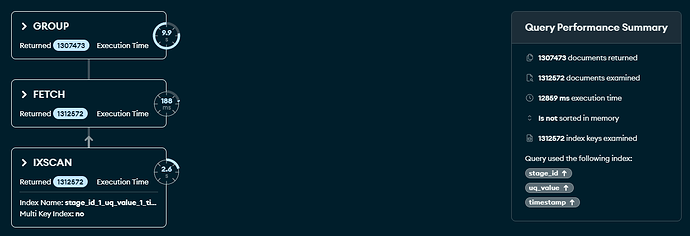Hello,
we have a collection of 1.3 million documents.
Documents have a flat structure, with no arrays.
Aggregation pipeline has 2 stages - $match by stage_id, uq_value and timestamp, and group by stage_id and uq_value, accumulating last element of the group with $last: “$$ROOT”.
stage_id and uq_value are strings, timestamp is Date field.
There is also compound index having stage_id ASC, uq_value ASC and timestamp ASC.
According to Explain Plan, query takes ~ 12 secs.
Here’s the Explain Plan output:
Mongo database should have enough memory for the covered query, memory is on 75%, so I do not get why it doesn’t happen and how to improve this query to run faster, preferably bellow 1 sec. I assume it’s possible.
Here is query example:
[
{
$match: {
stage_id: {
$in: [
"id_1",
"id_2",
//and so on, 30 values here
]
},
timestamp: {
$gte: ISODate("date_from"),
$lte: ISODate("date_to")
}
}
},
{
$group: {
_id: {stage_id: "$stage_id", uq_value: "$uq_value"},
last_event: {
$last: "$$ROOT"
}
}
}
]
uq_value is missing here in $match, because all values are included. If there is filter by that field, it will appear in $match after stage_id condition.
Can anyone help with this?
Thanks in advance!

